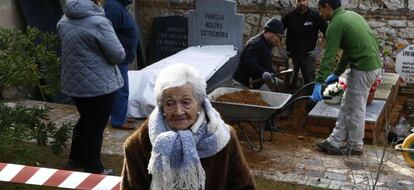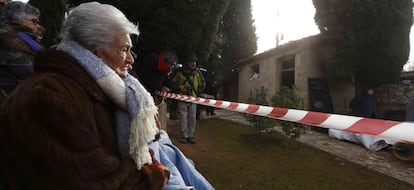“I want to find my father’s remains so I can be buried with him”
Archaeologists exhume a mass grave thanks to the work of 90-year-old Ascensión Mendieta


At the age of 90, Ascensión Mendieta has achieved the goal she has been fighting for all of her adult life: recovering the remains of her father, who was executed by Francoist forces on November 15, 1939.
“I want to be buried with him,” she says.
It is very cold on Tuesday morning at the cemetery in Guadalajara where the mass grave is located, but no one can convince Mendieta to go for a coffee while the exhumation takes place.
“My father was one of the first to be buried; he should be underneath the rest of them,” she says.
The day her father was executed and thrown into the grave, Mendieta was 13. At 88, she found herself on a plane bound for Argentina to meet with Buenos Aires Judge María Servini de Cubría, who, since 2012, has been conducting an ongoing international investigation into crimes committed during the Spanish Civil War and the subsequent Franco regime (1939-1975).
“My father was one of the first to be buried; he should be underneath the rest of them
The judge opened the inquiry when a group of victims and their families petitioned Servini de Cubría to investigate the crimes after Spanish High Court Judge Baltasar Garzón – who had been in charge of a similar probe – was suspended by the Supreme Court due to his actions relating to another case.
In 2014, Judge Servini de Cubría asked Spanish authorities to permit the mass grave to be exhumed. But it took nearly two years before judicial authorities in Spain gave the go-ahead.
Mendieta has grown accustomed to waiting. In fact, she couldn’t rest the previous night. “I woke up at around 3am and I just couldn’t get back to sleep,” she explains.
A diminutive woman, Mendieta cannot count the number of protest rallies she has attended over the years to ask for help to exhume all the mass graves across Spain where Franco supporters buried their victims. Sometimes she went with her sister Paz, who she wishes was still alive so she could witness the exhumation of their father’s remains. Paz died in 2012.
“My mother has given her savings, her years and her life for this,” explains Mendieta’s daughter, Pilar Vargas. “All she wants are her father’s remains so she can give him a decent burial.”
Timoteo Mendieta was 41 when he was murdered. The father of seven children, he worked as a butcher and from March 1937 onward he was president of the local UGT union chapter in his hometown of Sacedón, Guadalajara.

“The poor people didn’t have enough money to buy his meat, and the rich ones were not going to purchase at a store run by a ‘Red’,” Vargas recalls. “He couldn’t even find work in the fields.”
He joined the Republican forces during the Civil War and was later denounced by a military officer. Timoteo was sentenced to death by a war council for “aiding a rebellion.”
One day, his wife María, who was living in Madrid with her children for safekeeping during the war, received an urgent telegram from her sister. “Come to Guadalajara, quick!”
But it was too late. By the time she arrived “they told her that he had already been buried,” recalls Mendieta.
Archaeologist René Pacheco, who is in charge of the exhumation, says the work at the Guadalajara cemetery could take up to 14 days.
“My mother has given her savings, her years and her life for this. All she wants are her father’s remains so she can give him a decent burial
The conservative Popular Party government of Prime Minister Mariano Rajoy eliminated all funds to help people find the remains of their loved ones, something they were able to do thanks to a law passed by the previous Socialist administration. The Association for the Recovery of Historical Memory (ARMH) has had to rely on public donations and grants from diverse groups such as an electricians union from Norway and the Abraham Lincoln Brigade Archives (ALBA) in the United States.
In the morning, a judge stopped by for a few minutes to inspect the exhumation work at the cemetery. A prosecutor was also present at the site.
“Before we open any mass graves, we alert the judge who has jurisdiction in the area that we have found bodies that show signs of violent death,” the archaeologist explains. “But unfortunately, it is always the same story when it comes to justice – the statute of limitations has expired and families are left without any legal protection.”
Family members of other victims believed to also be buried in the Guadalajara cemetery also stop by. They want to give thanks to the diminutive woman who helped open up this mass grave.
English version by Martin Delfín.
Tu suscripción se está usando en otro dispositivo
¿Quieres añadir otro usuario a tu suscripción?
Si continúas leyendo en este dispositivo, no se podrá leer en el otro.
FlechaTu suscripción se está usando en otro dispositivo y solo puedes acceder a EL PAÍS desde un dispositivo a la vez.
Si quieres compartir tu cuenta, cambia tu suscripción a la modalidad Premium, así podrás añadir otro usuario. Cada uno accederá con su propia cuenta de email, lo que os permitirá personalizar vuestra experiencia en EL PAÍS.
¿Tienes una suscripción de empresa? Accede aquí para contratar más cuentas.
En el caso de no saber quién está usando tu cuenta, te recomendamos cambiar tu contraseña aquí.
Si decides continuar compartiendo tu cuenta, este mensaje se mostrará en tu dispositivo y en el de la otra persona que está usando tu cuenta de forma indefinida, afectando a tu experiencia de lectura. Puedes consultar aquí los términos y condiciones de la suscripción digital.








































